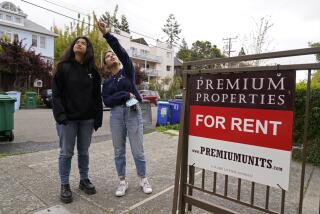Japan Real Estate Prices Sink for 8th Straight Year
- Share via
TOKYO — Real estate prices in Japan fell in 1998 for the eighth straight year, the government reported Thursday, extending a decline that has eroded the wealth of Japanese consumers and battered the nation’s psyche.
The latest report, documenting a decline that far outstrips the severity of Southern California’s real estate shakeout of nearly a decade ago, is likely to further undermine the confidence of beleaguered Japanese consumers, already hit by rising unemployment and near-zero interest rates on their savings.
“This is very worrisome,” said Masashi Yoshioka, a 51-year-old taxi driver who owns a house in the Tokyo suburb of Chiba. “I’ve always thought I could sell my house and my land if I had a real emergency. Now I can’t even see ahead.”
The real estate data, coming on the heels of an unexpectedly poor economic performance in the latest quarter, is the latest evidence that Japan remains locked in a deep recession despite the government’s massive spending to turn it around.
Many experts can’t see a market bottom any time soon. In fact, residential land prices fell faster last year--about 3.8% nationwide--than they did the year before, when they posted a 1.4% decline.
Even after so many years of decline, Japan’s property market remains out of line with most international norms. The price for a suburban property an hour’s ride from the center of Tokyo is still five or six times what its equivalent would be in London or New York, said Harumi Ichiki, an analyst with the Sumitomo Life Research Institute.
An ordinary two-bedroom home or condo in an average Tokyo neighborhood still commands $500,000 to $700,000.
Thursday’s report contrasts sharply with the outlook 12 months ago, when several noted analysts loudly predicted that the real estate market was at its low point and couldn’t fall further.
“This is very bleak,” said John Tofflemire, economist and general manager with CB Richard Ellis K.K., a real estate firm. “People think they can’t go any lower. I’d argue it can still go plenty lower.”
The news fanned concerns that Japan is in a deflationary spiral, wherein lower prices lead to more layoffs, leading in turn to fewer consumer purchases, more factory closures and still lower prices.
“We’re now in a deflationary economy,” said Koki Ozawa, analyst with New Japan Securities Co. “People can’t expect their salaries to go up. Therefore it’s very difficult to justify buying land.”
The decline was even sharper in the commercial real estate market last year, as prices fell by 8.1%, compared with the 6.1% drop seen in 1997. The major urban areas of Tokyo, Osaka and Nagoya were hit particularly hard, with some suffering double-digit declines.
From their peak in 1993, commercial property prices have tumbled by 51%, while residential prices are down 26.5%. Still, prices are up substantially from 1983, when Japan began keeping track.
The latest news could further undermine the confidence of consumers, whose willingness to spend money is urgently needed to spur an economic recovery.
The Japanese have traditionally placed much more weight on tangible assets, especially land, than on stocks, bonds or other financial assets, analysts said.
“Before 1990, you had several generations that believed in the intrinsic value of land and that its value could only go up,” said Richard Ellis’ Tofflemire. “Now it’s a store of negative value.”
This land bias, spurred on by the government’s easy-money policies during the late 1980s and a speculative frenzy, also led to rampant overpaying by Japanese for such foreign trophy properties as Rockefeller Center in New York and Arco Plaza in Los Angeles.
Now the investment tide has reversed. Even as Japanese companies move to sell their overseas real estate holdings, often at a substantial loss, foreign buyers are moving into Japan.
Starting in March 1998, U.S. and other foreign hedge funds began aggressively purchasing distressed Japanese loans backed by real estate, said Toshihiko Okino, senior analyst with Warburg Dillon Read.
Although the survey released Thursday by Japan’s National Land Agency is supposed to provide a snapshot of property prices on Jan. 1, the research was done in the second half of 1998 using 30,800 listed properties. Several analysts said they expect the price decline to continue this year and possibly next.
The picture is not all bleak. There have been signs of life in certain residential markets as Japanese interest rates hover at record lows. Long-term government bonds now carry a 1.7% interest rate, while short-term rates are as low as 0.5%. That’s good news for the few property shoppers.
*
Etsuko Kawase in The Times’ Tokyo bureau contributed to this report.
More to Read
Inside the business of entertainment
The Wide Shot brings you news, analysis and insights on everything from streaming wars to production — and what it all means for the future.
You may occasionally receive promotional content from the Los Angeles Times.









